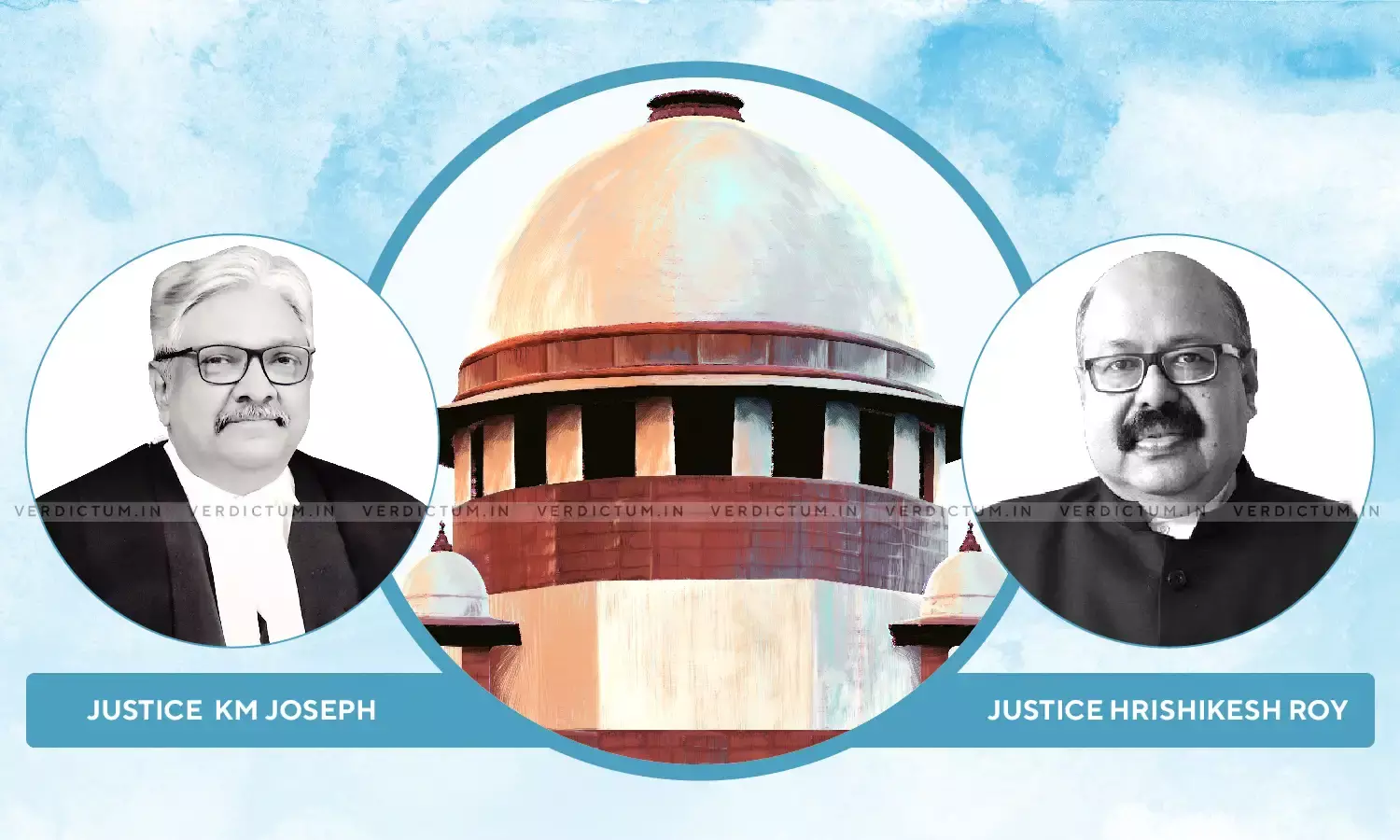Passing Of Confiscation Order Subsequent To Acquittal In Criminal Case Amounts To Violation Of Article 300A – SC
A two-judge Bench of Justice KM Joseph and Justice Hrishikesh Roy has held that the confiscation of the Appellant's truck when he was acquitted in the criminal proceedings amounted to arbitrary deprivation of his property and violated the right guaranteed to each person under Article 300A.
Counsel Mr. Pulkit Tare appeared for the Appellant, while Counsel Mr. Abhinav Srivastava appeared for the State of MP before the Apex Court.
In this case, the Appellant's truck loaded with 17 cow progeny was intercepted and the driver of the vehicle and one other person were arrested. The accused were charged under Sections 4 and 9 of M.P. Prohibition of Cow Slaughter Act, 2004 read with Section 11(d) of Prevention of Cruelty Act. The truck was seized and the accused were charge-sheeted for the aforesaid offences.
The JMFC held that the prosecution had failed to establish the primary ingredient of the charge that the cow progeny was being transported for the purpose of slaughter and no offence was made out under the 2004 Act. All the accused were accordingly acquitted.
Subsequently, the DM ordered a confiscation order of the Appellant's truck for violation of Section 6 of the 2004 Act despite being apprised of the acquittal of all the accused by the Trial Court.
The High Court upheld the order of confiscation of the DM with the observation that separate proceedings before two Forums, one for the prosecution of the accused charged with the offence and the other for confiscation of the vehicles/equipment used for the commission of the offence, were legally maintainable.
The High Court also held that the jurisdiction under Section 482 CrPC for quashing of confiscation proceedings initiated under the 2004 Act was not available to the Court.
The Appellant placed reliance on Nitesh s/o Dhannalal vs. State of M.P. to argue before Apex Court that in circumstances of confiscation of a vehicle, under the relevant provisions of the 2004 Act, the Court interpreted various provisions of the Act to hold that, unless the criminal offence is committed, seizure of the vehicle which was involved in the incident, would be unwarranted.
While the State referred to Section 13A of the 2004 Act to argue that the burden of proof is on the accused when he is being prosecuted under the Act.
The Apex Court noted that in the context of the proceedings initiated under the MP Prohibition of Cow Slaughter Act, 2004 and there being no bar to exercise of jurisdiction of Criminal Courts including the High Court under Section 482 CrPC, the High Court was competent to entertain the petition under Section 482 CrPC.
Further, the Bench opined that by reason of the order of confiscation, a person is deprived of the enjoyment of his property under guaranteed under Article 300A.
In this context, the Court held –
"Article 300A of the Constitution provides that no person shall be deprived of his property save by authority of law. Therefore, to deprive any person of their property, it is necessary for the State, inter-alia, to establish that the property was illegally obtained or is part of the proceeds of crime or the deprivation is warranted for public purpose or public interest."
Rejecting the contention of the State that the burden of proof is on the truck owner in the process of confiscation, the Court observed that Section 13A of the 2004 Act, which shifts the burden was not applicable to the confiscation proceedings but for the process of prosecution.
"By virtue of Section 13A of the 2004 Act, the burden on the State authority to legally justify the confiscation order, cannot be shifted to the person facing the confiscation proceeding. The contention to the contrary of the State's counsel, is accordingly rejected," the Bench noted.
The Court further held that the vehicle cannot be withheld and then confiscated by the State when the original proceedings had culminated into acquittal. It was also not the projected case that there was a likelihood that the Appellant's truck would be used for committing similar offence.
- M.P. Prohibition of Cow Slaughter Act, 2004 – Objective
The Court added that the objective of the 2004 Act is punitive and deterrent in nature.
Further, the Bench observed –
"Section 11 of the 2004 Act and Rule 5 of M.P Govansh Vadh Pratishedh Rules, 2012, allows for seizure and confiscation of vehicle, in case of violation of sections 4,5,6, 6A and 6B. The confiscation proceeding, before the District Magistrate, is different from criminal prosecution. However, both may run simultaneously, to facilitate speedy and effective adjudication with regard to confiscation of the means used for committing the offence. The District Magistrate has the power to independently adjudicate cases of violations under Sections 4, 5, 6, 6A and 6B of the 2004 Act and pass order of confiscation in case of violation. But in a case where the offender/accused are acquitted in the Criminal Prosecution, the judgment given in the Criminal Trial should be factored in by the District Magistrate while deciding the confiscation proceeding."
The Court noted that the circumstances were compelling to conclude that the DM's order of confiscation was not only arbitrary but also inconsistent with the legal requirements.
In the light of these observations, the Court held that the confiscation order of the DM could not be sustained. Also, the High Court's decision to the contrary was set-aside and the appeal was allowed.
Click here to read/download the Judgment












